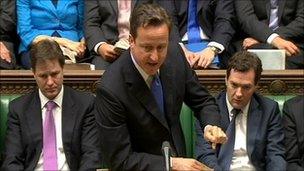Devolved leaders call for constitutional reform
- Published
The political leaders of Scotland, Northern Ireland and Wales have called for the UK government to join them in a "progress agenda".
They were meeting in Edinburgh for the first time since the May elections.
The leaders issued a joint statement backing social, economic and constitutional reform across the United Kingdom.
It said the elections bestowed on them renewed mandates as the heads of their devolved governments.
The trilateral summit was hosted by Scotland's First Minister Alex Salmond and his deputy Nicola Sturgeon.
Northern Ireland's First Minster Peter Robinson, his deputy Martin McGuinness and First Minister of Wales Carwyn Jones also took part.
The leaders discussed their shared agendas for the term ahead at Bute House in Edinburgh, the official residence of the First Minister.
At the Bute House meeting, the leaders underlined the welcome they gave to the UK government's commitment to a respect agenda in its dealings with the devolved administrations.
They said they were willing to work with the coalition government at Westminster on the basis of good communication, co-operation and mutual respect.
But they warned that the agenda of respect had to deliver results on the issues of greatest concern to voters, including economic growth.
The leaders of the devolved administrations pointed out that measures already being discussed with the UK government include financial reforms.
They indicated that they would be looking to address matters such as corporation tax, income tax and borrowing powers.
The statement issued after the Edinburgh meeting also highlighted proposals for further reform in Northern Ireland and measures to strengthen devolution contained in the Scotland Bill.

Leaders have re-affirmed respect agenda
The statement said: "We call on the prime minister and deputy prime minister to work with us to make progress on financial, constitutional and policy reform across the United Kingdom."
The discussions were part of preparations for the forthcoming meeting of the Joint Ministerial Committee of the governments of the United Kingdom, Scotland, Wales, and Northern Ireland, which will be chaired by the Prime Minister.
Following elections in Scotland, Northern Ireland and Wales on 5 May, nine different parties are now involved in governing the UK.
The Scottish National Party won an outright majority at Holyrood, while in Wales Plaid Cymru lost ground and Labour became the ruling party.
In Northern Ireland, the two biggest parties, the Democratic Unionists and Sinn Fein, increased their number of seats at Stormont.
The new presiding officers have now been elected in each of the administrations, and the new legislators have been sworn in.
- Published19 May 2011
- Published18 May 2011
- Published11 May 2011